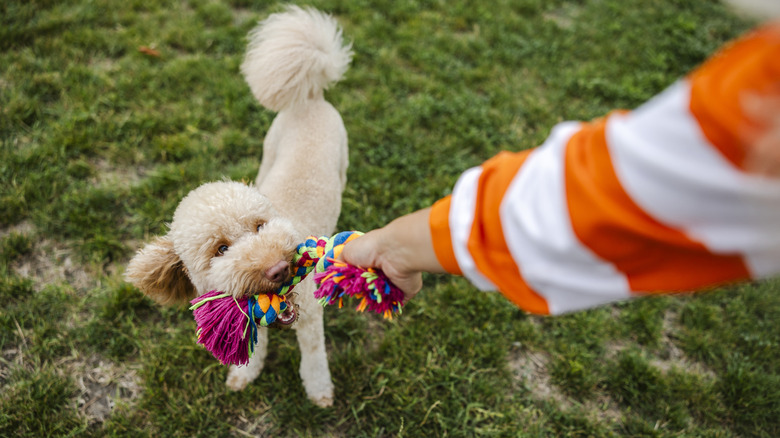The Hidden Downsides Of Owning A Highly Intelligent Dog
Most people would agree that intelligence is a desirable trait to pursue and to seek in others. Some would also say "yes" if asked if they want a super smart dog, because they assume that intelligence equates to obedience and other positive attributes. Surely an intelligent canine would never chew on furniture or shoes, or try to run away, because they know these behaviors are frowned upon, right? Not necessarily. Having a highly intelligent dog actually comes with some hidden downsides, including boredom-related misbehavior.
A few common misbehaviors that dogs exhibit as the result of boredom include shredding pillows, knocking over trash cans (and sometimes chewing on the contents), unrolling toilet paper rolls, and digging holes in the backyard. Working dogs, such as border collies, tend to have a breed instinct to have some type of responsibility — a job. Without a job, they can become bored and begin seeking other things to do to stay busy.
Some of the smartest dog breeds in the world include the border collie, German shepherd, English springer spaniel, and Papillon. Being mindful of misbehavior and disobedience risks that stem from the high intelligence of these breeds can help you take a more proactive approach to caring for your pup. These dogs can make great companions, despite the risks, and many of them are popular breeds for families. Here's how you can keep your smart dog occupied.
Boredom can lead to misbehaviors, but it's preventable
If you think back to elementary school, you may recall times when the most intelligent students were the ones causing the biggest classroom disruptions. They were usually the first ones to finish their work, so they'd get bored and find ways to entertain themselves. Many highly intelligent dogs are no different. They need more mental stimulation to keep themselves engaged and challenged.
Of course, this doesn't necessarily mean that every smart dog will inevitably misbehave. As a loving dog owner, you have many options to keep your canine companion entertained. For physical stimulation, one of the easiest things you can do (if you're able) is take your pup for a walk, play fetch, or play tug of war. You may also want to consider dog-friendly outdoor activities beyond your morning walk, such as swimming, hiking through the woods, and agility training. On a rainy day, or any day, add some mental stimulation by hiding treats in a snuffle mat or puzzle toy, or by giving a peek-a-boo stuffed toy. Giving your dog a "job" or task to do can also help with mental stimulation, preventing boredom behaviors.
Adding in mental and physical stimulation can also be a great way to bond with your very smart pup. With sufficient exercise and enrichment activities, your intelligent pup will be less likely to act out, which means you'll be less likely to have to come home to messes and damaged items. You just have to be willing to put forth the effort into creating these opportunities.

